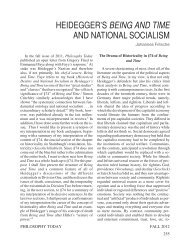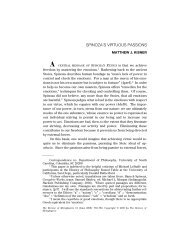Perverted Conversions: - Philosophy Documentation Center
Perverted Conversions: - Philosophy Documentation Center
Perverted Conversions: - Philosophy Documentation Center
You also want an ePaper? Increase the reach of your titles
YUMPU automatically turns print PDFs into web optimized ePapers that Google loves.
— 146 —<br />
Rachel Walsh<br />
• • •<br />
a national subject is contingent upon that viewer identifying with the heteronormative,<br />
white, secular, national body.<br />
The seemingly curious presence of the phallic women who posed with the Iraqi<br />
prisoners illustrates these modalities of interpellation. In one of the more iconic<br />
images, Pfc. Lynndie England stands before a row of men whose faces are hooded<br />
and whose bodies are exposed. Posed before the approving gaze of the camera, a<br />
phallic cigarette hangs from her lower lip, curved into a slight smirk, and her left<br />
hand gives the ubiquitous thumbs up sign as her right hand pantomimes a gun that<br />
is pointed at the men’s flaccid genitals. Her presence in the photograph accentuates<br />
the men’s impotence; her right index finger, making a phallic gesture, is engaged in<br />
a playful movement but also serves as a reminder that she does have recourse to the<br />
gun that she mimes. The men, with their hooded heads bent down, their hands<br />
before them trying to cover themselves, are positioned as being shamed by a woman<br />
who, assuming a masculine, nationalist role, views and mocks their failure to<br />
perform their presumably misogynistic, hypermasculine identities.<br />
Yet the act of shaming occurs at the women’s expense as well as the prisoners.<br />
England and Spc. Sabrina Harmon are permitted to masquerade in the patriarchal<br />
clothes of imperial power, but in doing so they merely reify a discourse that positions<br />
a woman’s assumption of authority as an absurd abnormality that is presumed<br />
only to shame and humiliate the Islamic Other. 32 Their authority is entirely contingent<br />
upon the subtext that there is something shameful and shaming about their<br />
assumption, however ephemeral, of authority. Further evidenced by the “invasion<br />
of space by a female method of torture,” the positions that England and Harmon<br />
assume as phallic women are imbricated in a masculinist discourse that views the<br />
female body as abject. By making prisoners wear women’s underwear on their<br />
heads and smearing their bodies with what was purported to be menstrual blood,<br />
the torturers acknowledge that there is something disgusting and repugnant about<br />
the female body, just as there is something sadistically comical about a woman<br />
assuming a position of authority before emasculated men.<br />
In addition, their staged positions cite familiar racist tropes about Oriental<br />
masculinity. The male Islamic Other can be easily emasculated by a woman in power,<br />
but paradoxically, his animalistic sexuality must be controlled and contained. This<br />
assumption is painfully apparent in a photograph that features England standing<br />
next to a naked, chained Iraqi prisoner with the word “rapeist” written on his thigh<br />
in black ink. England smiles for the camera and points to the misspelled word, which<br />
32. Kelly Oliver observes that, “It is the association of women, sex, and violence that make<br />
these images an uncanny reflection of our culture”; see her Women as Weapons of War:<br />
Iraq, Sex, and the Media (New York: Columbia University Press, 2007) p. 15.

















